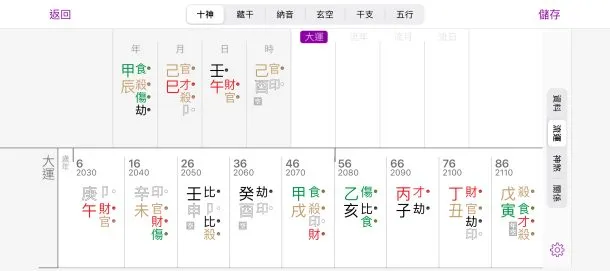Hey everyone! I realize that most new visitors to my website are Googling about love and wealth, which is not exactly a surprise. I’ll try to write more on these topics and bring everyone good content that everybody is interested in. Wealth and love are not the topics that immediately come to mind whenever I think about what to blog about. Not because it’s one of the most commonly asked questions using a BaZi consultation but also because I’ve set very clear plans for myself with regard to these two aspects of my life, and I know how it shows up on a BaZi chart.
I guess a lot of people out there are still hoping to get some guidance on from a metaphysics perspective. I’m going to talk a bit more in-depth about wealth today, and the difference between Direct Wealth (正财) & Indirect Wealth (偏财), and hopefully give everyone a clearer idea of what can be derived from someone’s chart in terms of wealth.
Before I move on, I wish to remind everyone again that metaphysics is not a shortcut to life’s problems, and it’s not a magical method that can help you become rich with a snap of a finger. I cannot emphasize this enough. You should be wary of any practitioner out there says that they can help you achieve that with a reading or with feng shui items. Do not fall into that mental trap that will only sabotage you in the long run. Practitioners show you the map, but you chart your own course and set sail regardless of whether it is a calm or turbulent sea ahead of you.
Now, let’s get on with the main topic of this post:
Is There A Difference Between Direct Wealth (正财) & Indirect Wealth (偏财)?
The short answer is yes. Direct Wealth and Indirect Wealth, strictly speaking, should not be regarded as the same thing, and the differences in their manifestations in real life will show up mostly in the person’s character and disposition, their attitude towards money and their way of acquiring money. It even has an impact on a man’s attitude towards marriage as well, and I’ve given a case study on this in my post on BaZi compatibility.
People with Direct Wealth as their anchor element/’god’ are known to prefer structure and have a stable source of income and they cling tighter to their money. As for the people with Indirect Wealth, they don’t usually cling to money as tightly as those under the influence of Direct Wealth. The inflow and outflow of cash tend to be much higher and it is due to their outgoing and friendly disposition and some of the most generous people I’ve met in my life have an Indirect Wealth chart structure. People with Indirect Wealth are also known to be very warm and friendly and do enjoy forming new bonds. This is the reason why modern books on BaZi associate business people with Indirect Wealth in their charts is because the way they are makes them really good business people due to the relationships they build and their pleasant personalities. They know when and how to let go and give out money so that they can earn even more back, and such an attitude towards money is often seen as a requirement for business success because of the risks and trust involved.
It’s not that people with Direct Wealth aren’t suitable for business, but their way of doing things will probably be very different, and they have a different style of conducting business. It’s more appropriate to assess the effects of Direct and Indirect Wealth based on one’s attitude towards money instead of blindly associating it with a particular career path. Choosing a suitable role for one’s career is possible using BaZi, but assessing this just by looking at the wealth element is not enough. I’ll write a post on choosing careers using metaphysics soon, as that’s another popular topic.
That said, please remember not to assess someone’s personality and character just because you see a very strong Direct or Indirect Wealth appearing in his or her BaZi chart. Yes, it is a sign and symbol in the chart, and it does give some indication of what someone can be like, but there is a lot more depth in a BaZi chart than you can imagine. For example, if you add the Indirect Officer ‘god’ into the chart, it changes the meaning of the wealth elements completely.
Is Having The Wealth Element In Your BaZi Chart Always A Good Thing?
No, it’s definitely not always a good thing. When we talk about BaZi analysis, it’s always about balance and looking at the elemental flow within the chart.
Although we associate money and wealth with comfort and the good things in life, this logic is not to be applied when breaking down a chart. I wrote a post on finding out whether you will be wealthy using BaZi previously, which you can check out.
Assessing the wealth element in one’s chart is always about assessing capabilities and resourcefulness.
I mentioned this theory in a post on the wealth sector and argued that the more appropriate way to see wealth is to view it as a resource we are drawing from. Every single thing in nature is feeding off something else: animals, plants, and even bacteria and viruses, and only the strongest survive and thrive. These are the laws of nature that will never change. Similarly, as human beings, the money we earn comes from someone else’s savings because they need something they have, and only the strongest and smartest get to draw this resource, in the form of cash, from others. But please remember that to draw resources from somewhere else. You need to be a strong individual first, meaning your capabilities must be there.
I always emphasize in my BaZi consultations that certain conditions need to be met for the positive side of a certain ‘god’ to manifest. This ties into what I said above, which is why you’ll often hear that your Daymaster must be strong before the wealth element can be welcomed in your chart. Because the opportunities to make money are always there, but not everyone has the capability to tap into such opportunities. On top of that, the wealth element itself must also be strong to make it a truly high-quality chart, symbolizing a sustainable source of wealth. The chances of having both a strong Daymaster and wealth element in your chart are very low, especially after we consider the combinations and clashes that can influence this, so most people will have to supplement the weaker element and flaws in their chart with their Elemental Phases. I guess this reflects what is happening in society, where a much smaller proportion of people are truly wealthy.
Some of you may already know that BaZi has 10 ‘Gods’, the 10 Heavenly Stems, and there is a formula to determine which Heavenly Stem manifests as which ‘god’. Every ‘god’ has a positive and negative side. However, some ‘gods’ such as Hurting Officer (伤官), Indirect Resource (偏印 or 枭神), Rob Wealth (劫财) and Indirect Officer (七殺 or 偏官) are generally associated with the negative in the Chinese classics, but that is not to say that these ‘gods’ don’t have a positive side – they do.
Direct Wealth and Indirect Wealth are generally considered favourable ‘gods’, along with other ‘gods’ like Direct Officer (正官), Eating God (食神) and Direct Resource (正印). The keyword here is “generally”. It’s usually a really good thing if one can meet all the favourable ‘gods’ in their chart because it does not trigger any taboo combinations or clashes, but certain conditions must still be met. We’ll have to look at the Branches and Elemental Phases for an overall assessment.
How To Assess The Effects Of Direct Wealth And Indirect Wealth In Your BaZi Chart
BaZi analysis is never a straight line, and I realized many people who study it on their own tend to jump to conclusions too fast. They barely skim the surface when they try to analyze a chart – perhaps being too eager to unlock this ability within them that has a huge novelty value for many people. The wealth element can become the 忌神 or destructive element for someone. In such situations, the chart-holder, in most situations, gets into trouble due to money or has a life which requires a relentless and tireless pursuit of wealth. For people with charts with the wealth element being a 喜神 or beneficial element, money goes to them and acquiring wealth does not feel taxing nor stressful, and on top of that, they still have the time to enjoy life.
Things do get a bit more complicated when we bring in the 5 Heavenly Stem Combinations 甲己,庚乙,丙辛,丁壬,戊癸 because we have to consider and assess the elemental output of these combinations and how it changes the role of the wealth element in one’s chart. Again, certain conditions need to be met for these conditions to have a genuine effect – just having them appear in a chart doesn’t usually mean much. This is another reason we should not regard Direct and Indirect Wealth as the same, even though both refer to wealth in general.
From my conversations with my clients and friends, success is always about the initial number you bring home at first. Still, once you hit a certain ceiling, the initial euphoria of a high income will start to numb out, and the pursuit of wealth will soon be about how much effort and time you spend slogging to hold on to that income. For example, perhaps for someone around my age, the initial aim is to reach a 5-figure monthly salary, but once you reach that level, it’ll be about how much time you have for yourself while you maintain or raise that income level.
Many people envy those in prestigious industries like law, banking and medicine. Still, we would be oversimplifying things and missing the point of living to conclude that everyone in that industry has a better life than those who aren’t. Trust me; they don’t.
One thing I want everybody to know is that, at least in the eyes of metaphysics, the number in your bank account or how much you’re bringing home is not indicative of a good life. Yes, I agree it makes things easier, but another question (and it’s a tough question) is, what have you done to think you deserve that kind of wealth? I know it’s never comfortable to have someone question why you deserve something, but trust me when I say it’s one of the questions I started asking myself when I interpreted learning BaZi and interpreting my chart.
What Happens When I Don’t Have The Direct Or Indirect Wealth In My BaZi Chart At All
I get this question a lot. Not having the wealth element in your chart does not mean that you are doomed to be poor. At the end of the day, what matters most is still your overall chart structure and the elemental phases (运) that you go through. If it is a high-quality chart, wealth will still come naturally, albeit from a different route, because a high-quality chart indicates a talented and capable person.
For people with high-quality charts with no wealth elements, it may manifest as a different focus in life or a different definition of success. Perhaps it’s title, reputation, power, or just being the best in their field. Wealth will still go to them no matter what. In contrast, those with high-quality charts with the wealth element will tend to see money as the sole aim, and it doesn’t matter how they acquire it. Wealth and nobility are two very different things in an ancient context, although these days when you have wealth, it’s easier to fall into the nobility category as well.
It’s rather hard to simplify someone’s character and disposition because this was never meant to be simplified. BaZi and Zi Wei Dou Shu do give some hints of natural inclinations, but let’s never forget that one’s environment and nurture have a huge role to play as well. I do have to say, though, that those with high-quality charts and whose chart structures hinge around the wealth element do tend to earn a lot more because that’s where their focus is, after all. Hence, people under chart structures like 偏财格 or 食伤生财格 tend to accumulate wealth a lot faster, although it doesn’t often come with a title and status. Yes, they can be Managing Directors of their own companies, but traditionally that’s not really what we mean by title and status. The 贵 in 富贵 more accurately refers to how much power and influence one has in society, and it’s often related to government positions or positions of power.
Having A Bad BaZi Chart & I’m Struggling With Money
I’ve lost count of the times people reached out to me via my website to ask how they can get richer. Be sure to check out one of my “must-read” articles on the difference between a good BaZi chart and a bad one, and you’ll know my thoughts on this. I don’t have a magical solution to this other than to work hard, have a passion, and just do something about your situation.
I know it sounds very cliché, but I really do feel that having a passion, knowing what you want and working on something greater than yourself will definitely eventually lead you somewhere, both materially and emotionally, and the conversations I’ve had with my clients does prove this point very clearly. Again, and I always stress this, metaphysics is not and will never be a shortcut to life’s problems.
Stop using the word “luck” or “wealth luck” because it will never come to you without you doing anything. Even buying a lottery ticket requires you to get off your sofa and have enough cash to stack the odds on your side. At the end of the day, it still boils down to your ability and attitude, and perhaps even karma, as shown by my client who struck the lottery many years ago. I know some people, especially those with good natal charts, do get a head start in life, but the rag-to-riches stories of successful people serve to remind us that we can’t keep blaming our background or where we started from, and I’ve met a lot of successful people who feel this way too.
I know the majority of the people who stumble upon my website are probably trying to interpret their own charts, so I hope this post gives you an idea of what to do and what not to do, how complex BaZi and Zi Wei Dou Shu analysis are and why some people simply deserve toe be wealthy. My only wish is that everyone doesn’t waste their precious time mentally torturing themselves and wondering if they will ever be wealthy.
Analyzing your chart inside out isn’t going to make that happen. What can happen with a chart analysis though, is a very honest description of your capabilities, resourcefulness, attitude and whether the environment is conducive for you to develop, take risks and start acquiring more resources for yourself.
-Sean









